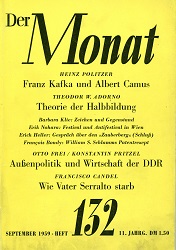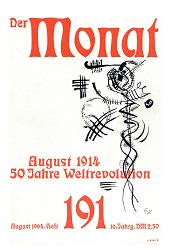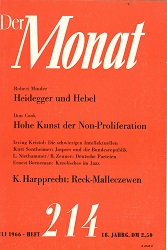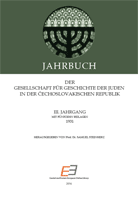
Jewish Topics in the New Czech Literature
Jüdisches in der neuen tschechischen Literatur.
xxx
More...
xxx
More...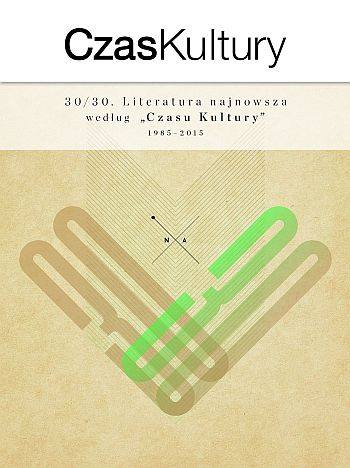
Keywords: polish literature;polish literary studies;polish culture journal
Krzysztof Siwczyk, Mariusz Grzebalski, Dobra nowina a rebours…; Natasza Goerke, Natasza Stelmaszyk, Jak Natasza z Nataszą; Elżbieta Winiecka, Gdy kończy się zima…; Dariusz Sośnicki, Fortuna i fatum. O poezji Andrzeja Sosnowskiego; Justyna Zimna, Język do oclenia...; Wojciech Hamerski, SF: struktura lodu; Tomasz Mizerkiewicz, Wirtualny odbiorca wirtualny...; Jerzy Borowczyk, Michał Larek, Rozmowa z Jerzym Pilchem; Justyna Zimna, Parafarmaceutyki kultury; Michał Larek, Katolicy, apostaci i poeci;
More...
Keywords: Serbia; intellectuals; war; humanists; Marina Cvetajeva; journalists; national programs; historians; gender; women rights; standard language; eschatology; politics; dissidents;
This volume, Intellectuals and War, follows on the heels of last year’s publication of Another Serbia. Like the latter, it is the result of the work of the Belgrade Circle. As the reader will recall, Another Serbia is a collection of over eighty talks given by members of this association of independent intellectuals and their guests, during ten of the sessions of the Belgrade Circle held every Saturday from the beginning of April to the end of June 1992. Intellectuals and War brings together some fifty texts, which were presented as part of the series »Intellectuals and War« organized every other week, for ten sessions from the beginning of October 1992 until the end of February 1993. At a time when every call for peace, national tolerance, and liberal democracy was being confronted with scorn, disdain, and open ridicule; at a time, that is, when even the most cautious doubts about the utility of the war, which might deflate the state mythology were being denounced as acts of treason committed by slanderers of the National Idea, the Belgrade Circle organized the thematic series, »Another Serbia« and introduced itself to the domestic public as one of the truly rare associations (not to mention political parties, the few exceptions not withstanding) whose members refused on principle to contribute to the destruction of other nations and the demise of their own. With this series and, particularly, with the publication of our book by the same name, the expression »Another Serbia« became a motto for all those who sooner or later came to see the dangers of the nationalist policies of the past five or more years. Unfortunately, many of the dark forebodings expressed in that first series proved to be true. With tragedies mounting at an alarming rate, many words that then sounded very strong, sometimes even, strident, have become but mild reproaches today. Words that once, only a year ago, were just short of blasphemy, have long since become commonplace in the mildest critical discourse in which almost everyone engages. Yet, in looking through the pages of Another Serbia today, one issue emerges from a number of the contributed works that still has not permeated public consciousness deeply enough and has only with great difficulty found its way into the conscience of those individuals to whom it directly refers. This is, of course, the matter of the responsibility of intellectuals for spreading national intolerance, inflaming hatred, advocating war, and – eventually – for instigating crimes and barbaric destruction and causing the isolation, poverty, denigration and scorn which has since come our way. With this in mind, the Belgrade Circle, as an association of – to repeat – independent intellectuals, decided to organize its second thematic series of discussions around this sensitive and uncomfortable question, which is often protected by taboo. The Belgrade Circle did not act impetuously in calling for an open examination of the role of public-opinion makers in the Yugoslav tragedy. Nor did it do so only after having seen the tragic results of conspicuous blunders by writers, scholars, and religious figures in irresponsible national mythmaking or – worse – in open incitement to war. Such a decision was part of the original motivation guiding the future founders of the Circle. Long before the disintegration of the country and before borders were redrawn, territory occupied and people expelled from their homes, they witnessed a number of their colleagues working as free agents or, more often, as institutional propagandists, dutifully reviving national myths, recounting the victims of pats years as if infatuated with death, reworking the ideology of land and blood and skilfully explaining the need for the South Slavic peoples to »separate« from one another once and for all. Seeing this, it became clear to the future members of the Belgrade Circle that it would not be long before these words were turned into deeds. The common denominator for the some twenty philosophers, sociologists, scientists, artists, and journalists who joined together in the Belgrade Circle was, in fact, the decisive refusal to participate in such undignified activities, which could only end in the horrors of war. In its founding Act, and later in number of public statements and individual appearances by its members, the Circle pointed to the responsibility of the »national intelligentsia« and »national institutions« for war and condemned their abuse of public speech. Although against political trials as a matter of principle, the Belgrade Circle argued in its first public statement that not only should politicians, military leaders, and those directly involved in executing their policies be held accountable for their deeds, but also intellectuals responsible for inciting war and causing crimes against humanity, the destruction of cultural and historical treasures, massive displacement of populations and the exile of numerous distinguished creative figures, and the involuntary flight of educated young people. The fact that it was precisely those individuals who given the nature of their work, should have been among our ranks, but chose instead to put their talents, knowledge, and reputation in the service of legitimising a new collectivism, who were the first to poke fun at the Circle and attack it with angry, even threatening messages made it convincingly clear that this important initiative was directed to the right address. At the crucial moment when the class-based identity of society began to collapse from within, these intellectuals, rather then putting their strength and authority into the democratic enlightenment of an apathetic citizenry actively helped to enthrone another new unifying principle, a new unio mistica which would, this time, be based on an artificially awakened and stimulated national identity. Thanks largely to these efforts, the opportunity to become a society of free individuals who act as autonomous citizens in the political sphere and not as anonymous members of the one and only Class, on Nation was again – and, again for a long time – gambled away. Put simply and crudely: once again, »ideologues«, »clerics«, and »guard dogs« have sold us a bill of goods. Few or the participants in the series »Intellectuals and War« were prepared to say that all »national intellectuals« were guided by evil intentions, hatred toward other peoples, vicious greed, futile craving for fame and honour, or the desire to gain the favour of the new/old rulers. It was clear to our authors that there were honest and intelligent people among these »national intellectuals« who sincerely believed that after the fall of the »old regime« it was more important to resolve the national question than to work for the establishment of parliamentary democracy. Reality – as is most often the case – provided them with a real basis for dissatisfaction. However, just as the framers of the idea of the social revolution before them, they turned to the implementation of the national revolution, without paying attention to the means those contracted do to the job – nurtured as they were in our rich tradition – would more than likely use. Thus, it is hard to resist the conclusion that the war began in words. Any rational observer of the now distant events could reasonably have expected the abbreviated series of exchanges between abstract ideas and concrete acts to turn easily and rapidly into bullets. After all, doesn’t the saying go: the pen is mightier than the sword!? A majority of the authors contributing to this volume, share the belief that if intellectuals – who have since become peace advocates – are now amazed and horrified by the sea of spilled blood, the ruined cities and villages, the rivers of displaced and uprooted people, and the previously unimaginable faschisation, impoverishment, and criminalisation of society, they must – if nothing else – face up to their own professional and moral responsibility for this. But this is a question of individual conscience which no one may or should pas a judgment. Some of the text, however, express the belief that another kind of responsibility – one that presumes more tangible consequences than merely having to confront oneself – must surely fall on the shoulders of that »portrait gallery« of our intellectual guard who have consciously advocated war and misted the people, captivating them with otherworldly messages, promising them the heavenly city, submerging them into the past, offering them dignity through force, and turning them away from the most natural desire to live a better and happier life with Others rather than in isolation from the outside world, imprisoned by self-love. One moment openly, the next moment covertly, they supported the consolidation of an authoritarian and indifferent regime, which would carry out the dirty work for them and for the greater glory of the Nation. They graciously allowed the forces of evil to strike, always ready to put the intellectuals’ most daring plans into action. Sometimes participating directly in the government, but more frequently, acting in the shadows as advisors to the absolute ruler and his priests and in collusion with our Volksgeist, these intellectuals were not prepared to take a stand at those moments when the people appeared to have come to their senses. They introduced even greater discord into the already confused political scene as they entered into the ranks of political parties that had the appearance of becoming democratic. Through both their silence and action, they allowed the uneducated electoral body to surrender itself to the one and only real leader. With these texts in front of us, it is tempting to outline a series of »generic-types«, that is, to construct a certain number of »ideal types« from among our national intellectuals. It is easy to understand those readers who would be happy with a string of unique caricature-like portraits. We have merely to think about all those crazed painters, poets of hearth and home, ominous prophets, patented demystifyers of planetary conspiracies and experts in deconstructing the »new world order«, ethno geneticists and amateur historians who trace their nation’s roots to ancient, even prehistoric times, former Marxists who find solace for their collapsed ideology in the »sweet joy of belonging« to the Nation, indefatigable drafters of geopolitical maps, and journalists and columnists who have persistently presented our unsophisticated readers and television audiences with an up side down picture of history and the world. But for now, let’s just keep these in mind: as, in this brief introduction we cannot even hope to sketch out such a typology, much less, to take on a detailed study of some prominent cases. What we can do is hope that a future systematic examination of the role of intellectuals in the wars we are going through will enable us to arrive at an answer to the question posed by the authors of this volume. They themselves have not been motivated by the ambition to offer an answer now and this motivation could hardly be sad to be common denominator among the various texts, which differ both in genre and in the opinions they present. As in Another Serbia, the contributors to Intellectuals and War have their own views and are alone responsible for their words.
More...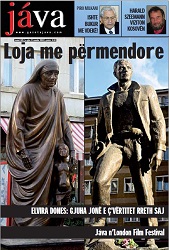
Keywords: Kosovo 2002; Xhavit Haliti; Piro Milkani;
More...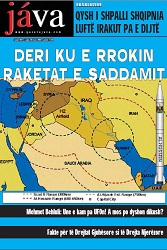
Keywords: Kosovo 2003;
More...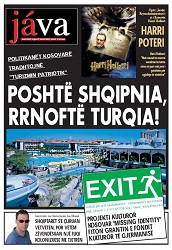
Keywords: Kosovo 2003;
More...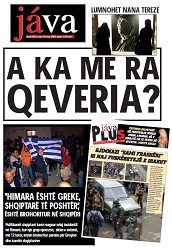
Keywords: Kosovo 2003;Hashim Thaçi;
More...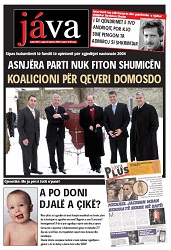
Keywords: Kosovo 2004;
More...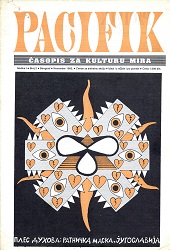
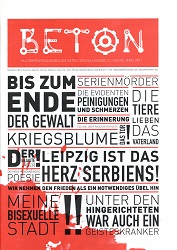
Keywords: Serbia; Kosovo; Radovan Karadžić; literature; politics;
Saša Ćirić: BIS ZUM ENDE DER GEWALT; Arben Atashi: RICHTUNGENDER NEUENPROSA IM KOSOVO; Besä Salihu: 75 (ODER NOCH MEHR) STUNDEN; Tomislav Marković: DAS ABC ÜBER RADOVAN KARADŽIČ; Miloš Živanović: DAS TOR; Arben Idrizi: DIE TIERE LIEBEN DAS VATERLAND; Arben Idrizi: WIR NEHMEN DEN FRIEDEN ALS EIN NOTWENDIGES ÜBEL HIN; Halil Matoshi: DIE NEUE KOSOVARISCHE POESIE; Trina Gojani: AUCH SO WIRD NUN MAL GESTORBEN; Xhevdet Bajraj: SEELENBLÜTE, DIE WILDEN TAUBEN UND DER TOD, EINST UND JETZT, SERIENMÖRDER; Ildikö Lovas: DAS KINO; Halil Matoshi: WIE LEICHT WAR ES DIE MUTTER AUF DEN SCHULTERN ZU TRAGEN...; Balsor Hoxha: MEINE BISEXUELLE STADT; Slobodan Bubnjević: FORTSCHRITT 1; Barbara Marković: HALBTRAUM; Saša llić & Jeton Neziraj: KORRESPONDENZ; Shkelzen Maliqi: ÜBER DAS ZOON POETIKON; Tomislav Marković: BITTE, MINISTER; Mihajlo Spasojević: EIS; Xhevdet Bajraj: SIEBTER STOCK; Bekim Lumi: DIE NEUE DRAMATIK IM KOSOVO; Jeton Neziraj: ROT UND SCHWARZ; Xhevdet Bajraj: NACHTS IN M.C., DAS HAUS, DER BINDESTRICH, PARTY, KRIEGSBLUME, HEIMAT, DAS NEBELPFERD, FRIEDEN; Jelena Đokić: STRÄFLICH ÖFFENTLICH; Kujtim Rrahmani: DER PURPURTEPPICH; Kujtim Pacaku: DIE ERINNERUNG, ZWEI BETRUNKENE, BLUMEN FÜR DICH, ERZÄHLT MIR; Halil Matoshi: DIE SCHÖNHEIT DER TRAURIGKEIT; Arben Idrizi: AUF DER FAHRT ZUR MUTTER; Szerbhorväth György: DER GEJAGTE JÄGER; Shpetim Selmani: DAS BIER, DIE VERZWEIFLUNG, DIE HOFFNUNG; Xhevdet Bajraj: IM WAL-MART; Arben Idrizi: UNTER DEN HINGERICHTETEN WAR AUCH EIN GEISTESKRANKER; Halil Matoshi: DIE EVIDENTEN PEINIGUNGEN UND SCHMERZEN; BETON: UNERWÜNSCHT IN SERBIEN UND IM KOSOVO
More...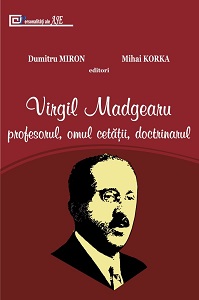
Keywords: Romanian higher education history; higher commercial and industrial studies; new disciplines in the curriculum; doctoral seminar; interdisciplinary research; civic activism; schools of economic though
This volume is a collective work dedicated to the memory of Virgil Madgearu (1887-1940) a preeminent professor of the Academy of Higher Commercial and Industrial Studies, the innitial name of the Bucharest University of Economic Studies. Each chapter of the book reveals defining elements of Madgearu’s life and work, his beliefs, viewpoints and active involvement in the academic and institutional development of the university (1917-1940), in the interdisciplinary research of the economy and society, in shaping the Romanian peasant doctrine and promoting Europe wide the interests of agrarian countries, in assuming political responsibilities as parlamentarian or as member of various interwar governments. As a respected professor and a leading politician he vigorously rejected the presence and influence of extreme right movements in the society and that valiant attitude was at the origin of his assassination in November 1940.
More...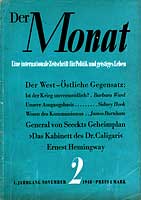
Please download the Introduction-PDF which you find below to see en détail what you can find in this issue. Thank you.
More...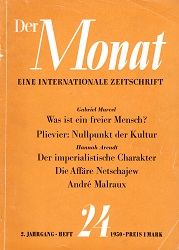
Please download the Introduction-PDF which you find below to see en détail what you can find in this issue Thank you.
More...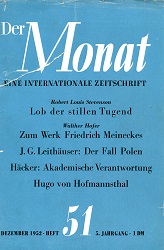
Please download the Introduction-PDF which you find below to see en détail what you can find in this issue Thank you.
More...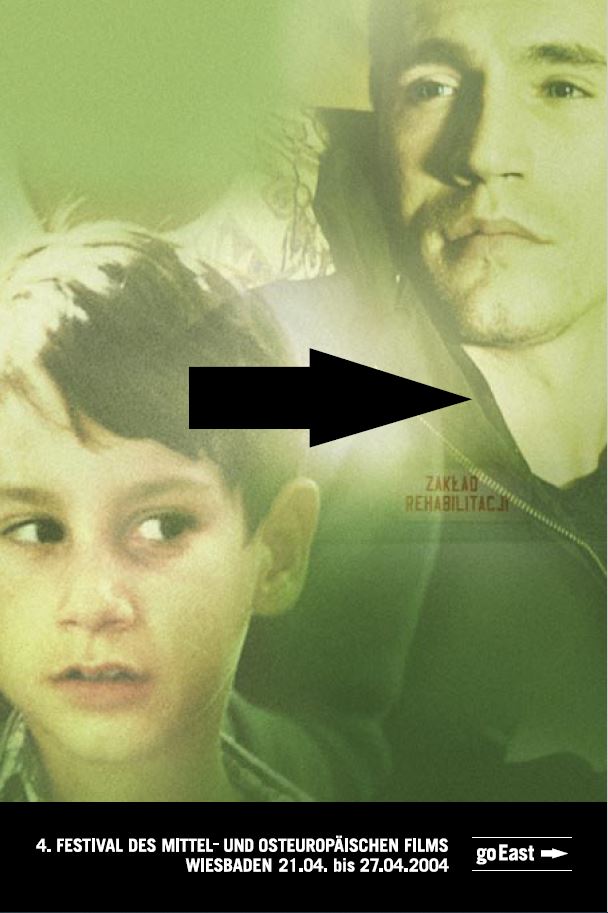
Keywords: festival;catalogue;film;
More...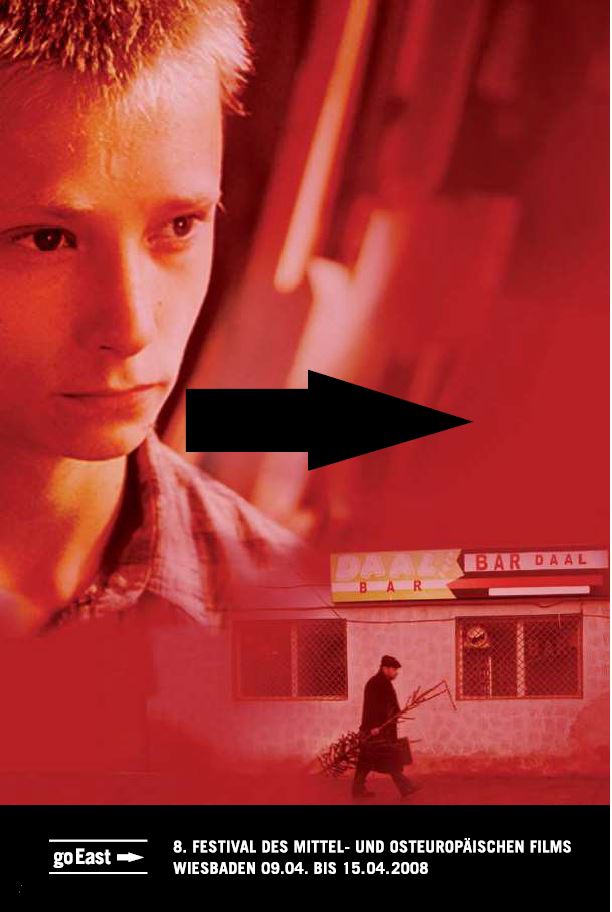
Keywords: festival;catalogue;film;
More...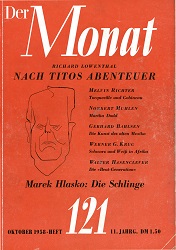
Keywords: J. B. Tito; A. de Tocqueville; Gobineau; Martha Dodd;
More...